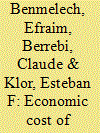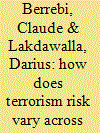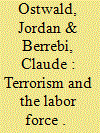| Srl | Item |
| 1 |
ID:
094738


|
|
|
|
|
| Publication |
2010.
|
| Summary/Abstract |
The literature on conflict and terrorism has paid little attention to the economic costs of terrorism for the perpetrators. This article aims to fill that gap by examining the economic costs of harboring suicide terror attacks. Using data covering the universe of Palestinian suicide terrorists during the second Palestinian uprising, combined with data from the Palestinian Labor Force Survey, the authors identify and quantify the impact of a successful attack on unemployment and wages. They find robust evidence that terror attacks have important economic costs. The results suggest that a successful attack causes an increase of 5.3 percent in unemployment, increases the likelihood that the district's average wages fall in the quarter following an attack by more than 20.0 percent, and reduces the number of Palestinians working in Israel by 6.7 percent relative to its mean. Importantly, these effects are persistent and last for at least six months after the attack.
|
|
|
|
|
|
|
|
|
|
|
|
|
|
|
|
| 2 |
ID:
079646


|
|
|
|
|
| Publication |
2007.
|
| Summary/Abstract |
We study the spatial and temporal determinants of terrorism risk in Israel, using a geocoded database of Israeli terrorist attacks from 1949 to 2004. In selecting targets, terrorists seem to respond rationally to costs and benefits: they are more likely to hit targets more accessible from their own homebases and international borders, closer to symbolic centers of government administration, and in more heavily Jewish areas. We also examine the waiting time between attacks experienced by localities. Long periods without an attack signal lower risk for most localities, but higher risk for important areas such as regional or national capitals
|
|
|
|
|
|
|
|
|
|
|
|
|
|
|
|
| 3 |
ID:
076115


|
|
|
| 4 |
ID:
089642


|
|
|
|
|
| Publication |
2009.
|
| Summary/Abstract |
With the discovery of large quantities of natural gas, the Qatari economy has experienced sustained economic growth. Similar to what has occurred in other Gulf states, a consequence of this economic boom is that the demand level for skilled and unskilled labor far outstrips that which Qatari nationals can provide. As a result, Qatar has imported foreign labor to the point where foreigners outnumber Qataris by almost seven to one. Moreover, the structure of the labor market - in particular, the system of generous and near-guaranteed public sector employment - diminishes incentives for Qataris to acquire valuable skills and to work in the private sector. The reliance on foreign laborers and the lack of skilled Qatari workers is widely seen by Qatar's leaders as a serious threat to the nation's economic autonomy and long-term economic viability. Thus a key challenge facing policymakers is to devise policies and reforms that will help develop a domestic workforce with the skills and incentives to work in the economy's most important and competitive positions. Drawing on public data sources, this article provides a detailed quantitative assessment of the economic and demographic situation that underlies the current challenges and discusses several policy options that might be used to help overcome them.
|
|
|
|
|
|
|
|
|
|
|
|
|
|
|
|
| 5 |
ID:
143294


|
|
|
|
|
| Summary/Abstract |
Recent studies have identified correlational associations linking terrorism and females’ standing in the labor market. Theories have been proposed to explain these associations. Some concluded that women’s participation in the labor force could be the driver that moves terrorism; others proposed that terrorism motivates the deviations in the labor force. No study has adequately explored causality and the direction of this association. Using a panel data set of 165 countries and terrorism data from 1980 to 2007, we find that terrorist attacks decrease female labor force participation and increase the gender gap between male and female labor force participation. By exploiting variation across countries and time, we are able to identify and quantify these effects; we are also able to address endogeneity concerns by using two novel instrumental variable approaches. The results are statistically significant and robust across a multitude of model specifications.
|
|
|
|
|
|
|
|
|
|
|
|
|
|
|
|